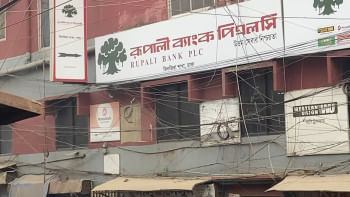Reforms to fall flat if defaulters spared

Any reforms in the banking sector will not be effective if those are made sparing loan defaulters, says Khondkar Ibrahim Khaled, former deputy governor of Bangladesh Bank.
Instead, such reforms will bring in more challenges for the banking sector, he told The Daily Star in an interview recently.
He went on to criticise the host of changes that Finance Minister AHM Mustafa Kamal ushered in to the banking sector soon after taking charge at the beginning of the year.
It started with the relaxation of loan write-off policy in February and loan classification rules in April and crescendoed with the offer of fresh rescheduling facility for defaulters with favourable terms.
“Could we term those as reforms?” questioned Khaled.
As per the new loan write-off policy, banks can write off from their balance sheet the defaulted loans that have been hovering in the bad category for three years, down from five years previously.
And under the loan classification policy, borrowers across the board will be given more time to pay back their instalments before they are marked as troubled.
As per the new rescheduling policy, defaulters would be allowed to reschedule their classified loans by providing only 2 percent down payment, instead of the existing 10-50 percent.
A maximum of 9 percent interest rate would be levied on the rescheduled loans, which is lower than the existing 12-16 percent. The time for repayment was also generously set at 10 years with a grace period of another year.
The policy said the accrued interest on the defaulted loans could be waived based on the bank’s relationship with the client, and the defaulter could only pay the principal amount and the new 9 percent interest rate.
“No country in the world has an instance of rescheduling defaulted loans with only 2 percent down payment,” said Khaled, who served as the BB deputy governor from 1998 to 2000.
The banking sector’s troubles will only get worse when the changes come to full effect, he pointed out.
The changes were initiated to coax defaulters to eventually pay back their loans, but China succeeded in bringing down its loan defaults by taking on the exact opposite approach, he said.
China took the stick approach and Bangladesh is going for the carrot approach.
The Chinese government seized the passports of bank defaulters or cancelled their travel documents. Bank defaulters were not allowed to be part of any state committee, mentioned Khaled.
“The approach of the Chinese government, in fact, brought good results as the amount of defaulted loans declined significantly.”
This proves that punishment helps bring down defaulted loans, and any kind of support increases defaulted loans, he said.
“We are walking in reverse. The finance minister needs to understand it.”
The biggest problem in the banking sector is defaulted loans, and it was created because of the unholy nexus among bank sponsors, board of directors and higher-ups of bank managements, he noted.
“It is not possible to curb the default loan culture when this unholy nexus is allowed in the banking sector,” said Khaled, who previously served as managing directors of Pubali Bank, Sonali Bank, Agrani Bank and Bangladesh Krishi Bank.
If the board of any bank is good, then the employees follow their lead, he said, citing the example of Pubali Bank to further his point.
The bank used to be in all sorts of problems, but once the right set of people took charge it straightened up. Today, it is one of the best run banks in the country.
But to get the right people, the central bank will have to play its role, mentioned Khaled.
“It must ensure professional people come to the bank board and carry out their responsibilities sincerely,” he said, calling for BB’s vetting before appointing a director.
But for that, the BB must be given a lot of autonomy, he pointed out.
“With the given situation, the central bank cannot exercise its power properly,” he said, adding that the finance ministry often drafts notices and forwards them to BB for execution.
Khaled urged the government to take the International Monetary Fund up on its recommendations for the banking sector.
“But the government’s reform decisions are always influenced by a few rich people,” he added.


 For all latest news, follow The Daily Star's Google News channel.
For all latest news, follow The Daily Star's Google News channel. 








Comments